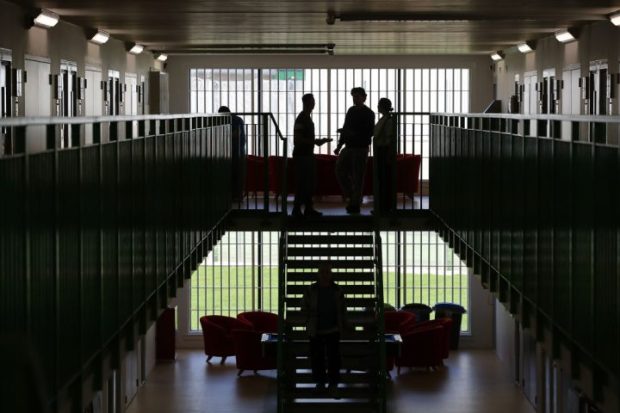‘We all have to be responsible for the fact that our health touches upon those who we sit next to and who we share air with. And this is a public health truism that is self-evident,’ said health minister Lord Bethell, answering a question about mandating vaccine passports in nightclubs in the House of Lords. Yet according to Brunel University Physicist Dr Colin Axon, medics (and presumably Lords) have a ‘cartoonish’ understanding of how tiny particles travel through the air.
There is a political war on breathing — the very thing that keeps us all alive. And Bethell is not alone. Dr Sarah Jarvis recently told Jeremy Vine, ‘Breathing is an offensive weapon if you are infected with Covid.’ Even allowing for a bit of dramatic licence on TV, it is impossible to imagine someone saying that pre-Covid. Of course, breath is life itself. Meditational and spiritual practices involve breath-work, famously the Vipassana. God breathed life into Adam, and Saint Paul said ‘all scripture is breathed out by God’. Breath has fallen from sacred to sinful.
Epidemics unsettle our political compasses. It’s known that fear induces a desire for authoritarian control. Humans crave security during chaos. In fact, authoritarian governments are more likely to emerge in regions characterised by a high prevalence of disease-causing pathogens. This epidemic has also thrown our moral compass. One study found that during Covid ‘health-minded approaches have been moralised, even to the point of a sacred value’ and that ‘merely questioning sacred values led to moral cleansing’. Defending lockdowns and restrictions was seen as moral, and questioning them seen as immoral.
Morality has been generally topsy-turvy in a time riven by fear. We have no tolerance for Covid deaths but seemingly little interest in deaths from other causes. We were told we must protect the elderly, yet they were transferred from hospitals to care homes and last week we discover that 50,000 dementia cases have been missed. The government showed a worrying enthusiasm for the furtive use of shaming, bullying and fear-mongering to make the nation comply with lockdown rules. Culturally and economically, lockdown was easier for the middle classes and elite, rather than the working classes and front line workers who serviced them. Feminists tie themselves in knots explaining why ‘my body, my choice’ does not extend to vaccine mandates. Schools closed. People died alone at home. Focussing on one virus was never a simple moral equation.
Martial language has been used throughout the epidemic. We are ‘at war’ with a virus. In the summer of 2020, Boris Johnson compared Gavi (The Global Alliance for Vaccines and Immunisations) to Nato, revealing a seismic paradigm shift in how we perceive our ‘enemies’. Fighting talk conveys strength and offers hope of winning when we feel out of control. But war also requires populations to make sacrifices and obey the chain of command. It reminds us we are not just at risk, we are the risk. We are the enemy.
Georgio Agamben, the Italian philosopher, has written about the reduction of life to biopolitics. To simply reduce the theory, he says that the man who is ‘accursed’ (in this case infected or even potentially infected) can be set apart from normal society, and must live a ‘bare life’ — life reduced to the barest form. In the ‘state of exception’ normal laws and morals are forgotten.
As war and terror justify a security state, the virus justifies a biosecurity state. Borders are redrawn from the geopolitical to biopolitical and policed by the state. The legal detention of healthy people, the punishment of rule-breakers and the mandating of vaccine passports are permitted by emergency laws but also enabled by a narrative of dehumanisation. People who break the rules are ‘dangerous’ (they might be infectious), ‘stupid’ and ‘socially irresponsible’. The unsafe, unclean and dangerous might breach the air of the virtuous vaccinated. These attitudes originally arise from the natural fear of an epidemic, but they are upheld by the continuing manipulation of fears.
We are simultaneously told that if you have the vaccine you can still be infected with and spread Covid, but if you don’t take it you are putting others at risk. The argument should fold under the weight of its own incoherence, but instead vaccine passports are being mandated in multiple countries with eerie synchronicity. It’s not conspiracism or paranoia to be alarmed by such developments.
In Israel, the language used to describe the unvaccinated is depressingly divisive. ‘Those who refuse vaccines are endangering their health, those around them and the freedom of every Israeli citizen,’ said prime minister Naftali Bennett. ‘Those who refuse vaccines hurt us all because if all of us were vaccinated we would all be able to maintain daily life.’ The unvaccinated are to be barred from much of public life, from cinemas to synagogues, unless they get tested.
Here in the UK, Michael Gove has pronounced judgement on the unvaccinated — they are ‘selfish’. Is this a ploy to encourage ill will, division and citizen policing? Boris Johnson reportedly considered widening the scope of his illiberal plans for vaccine passports from nightclubs (an unsurprising first choice of venue as they are a relatively easy moral win) to university lecture halls. Will the Bullingdon Club demand double jabs for its notoriously raucous parties?
We have lived through a pandemic, which is a naturally frightening time. While crisis can catalyse exciting and positive change, a new moral code should not be forged in fear. This is the time to pause. Take a deep breath. And feel once again for morality’s true north.
<//>
Got something to add? Join the discussion and comment below.
Get 10 issues for just $10
Subscribe to The Spectator Australia today for the next 10 magazine issues, plus full online access, for just $10.




















Comments
Don't miss out
Join the conversation with other Spectator Australia readers. Subscribe to leave a comment.
SUBSCRIBEAlready a subscriber? Log in